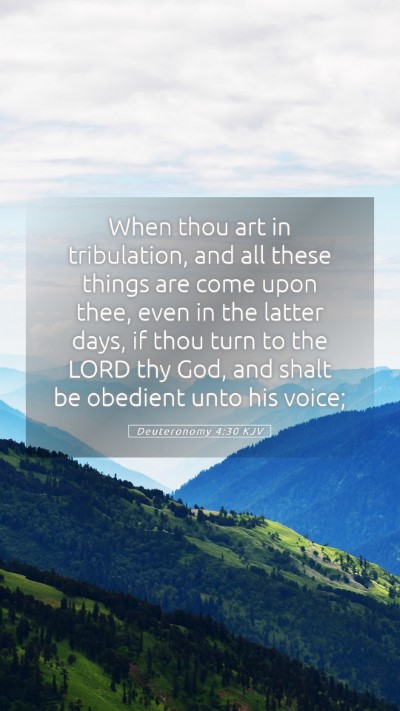Understanding Deuteronomy 4:30: A Comprehensive Bible Verse Commentary
Deuteronomy 4:30 states, "When you are in distress and all these things have happened to you, then in latter days you will return to the Lord your God and obey him." This verse is rich in meaning and offers profound insights into the nature of God's relationship with His people, the consequences of disobedience, and the hope of restoration. Below is an in-depth analysis of the verse, drawing from respected public domain commentaries to provide clarity and understanding.
Verse Breakdown and Interpretation
The verse can be broken down into two main components:
- Distress and Consequences: This part reflects the inevitable consequences of turning away from God's commandments. The Israelites were warned that neglecting their covenant with God would lead to hardship and suffering.
- Return and Restoration: This highlights God's mercy. Despite the struggles they would face due to their disobedience, there is an assurance that turning back to God would lead to forgiveness and restoration.
Biblical Exegesis of Deuteronomy 4:30
According to Matthew Henry, this verse serves as a reminder of God's enduring faithfulness. He emphasizes that the trials faced by the Israelites would eventually bring them to repentance, prompting a return to God’s teachings. This highlights the cyclical nature of sin and redemption throughout the Scriptures.
Albert Barnes points out the prophetic undertones of this verse, noting that it speaks to the future challenges Israel would face, yet promises that their return to God is always possible. Barnes indicates that this reflects the covenantal nature of God’s dealings with His people—regardless of their failings, He remains open to their return.
Adam Clarke adds that this passage foreshadows a critical aspect of Jewish history and their eventual redemption. Clarke interprets the "latter days" as a time when the Israelites will recognize their errors and seek repentance, suggesting a deeper spiritual awakening and a call back to the covenant relationship with God.
Application and Significance
The significance of Deuteronomy 4:30 extends beyond its immediate context; it serves as an encouragement for all believers. The verse reassures us that despite our struggles and distances from God, there is always a path back to Him. This has profound implications for personal faith journeys and communal worship.
Practical Applications in Daily Life
- Repentance and Forgiveness: Understanding the nature of distress as a consequence of straying from God can lead to genuine repentance.
- Faith and Hope: The promise of restoration must encourage believers to maintain faith during times of hardship.
- Covenant Relationship: This verse encourages a deeper understanding of one’s commitment to following God’s guidance and commands.
Further Reflection and Study
For those interested in delving deeper into the meanings of this verse, consider the following Bible study resources:
- Bible Study Tools: Utilize tools like concordances and lexicons to explore the original Hebrew terms used in this verse.
- Online Bible Study: Join forums or groups that focus on Old Testament studies to gain insights from various perspectives.
- Bible Study Guides: Refer to structured approaches for studying difficult passages within the Pentateuch.
Related Bible Cross References
- Deuteronomy 30:1-3: Confession and return to the Lord.
- 2 Chronicles 7:14: A call to repentance and healing from God.
- Romans 11:26: The ultimate restoration of Israel.
Conclusion
In conclusion, Deuteronomy 4:30 provides profound insights into the nature of human struggle, divine patience, and the ever-present opportunity for redemption. It emphasizes God's willingness to forgive and restore those who seek Him earnestly. This verse is a testament to the grace of God and encourages believers to remain steadfast in their commitment to faith, looking forward to the promised restoration.


